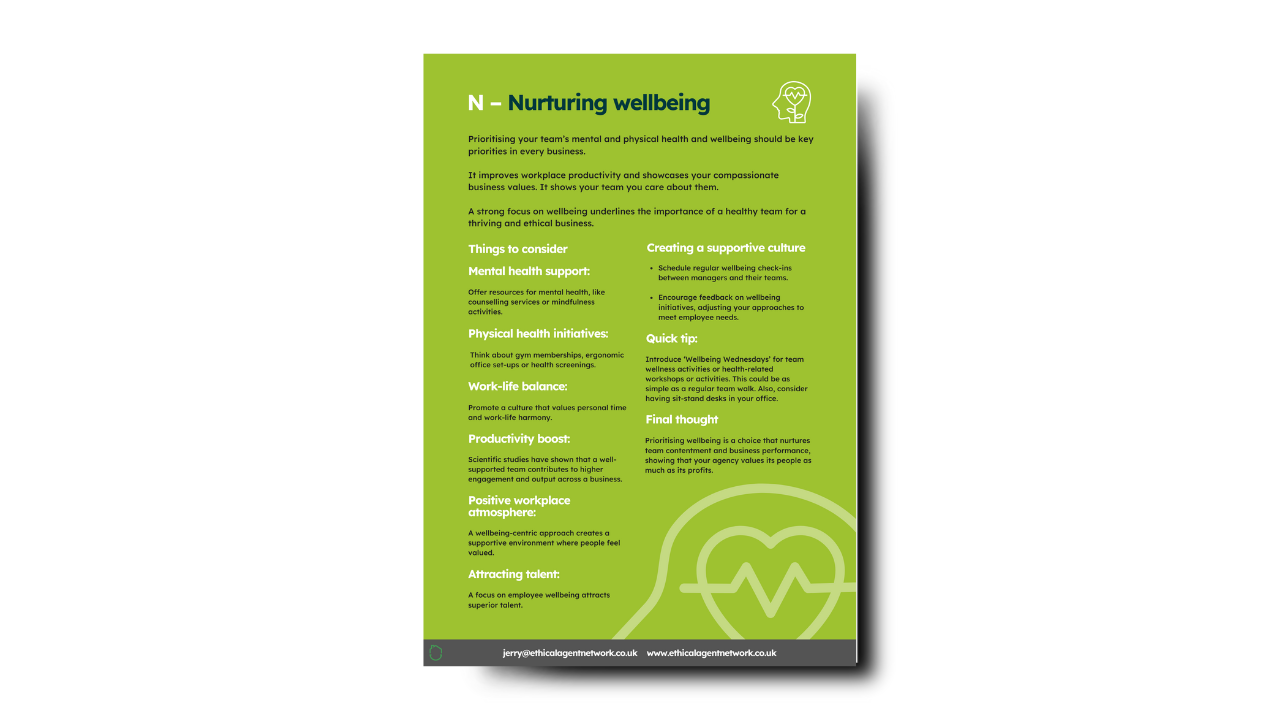Hello Folks,
“Howzit?” As my South African mate, Jan-Hendrick would say.
Last week, we looked at the J to L section of the Guide to Ethical Estate Agency.
This week, it’s the turn of letters from M to P.
We explore what makes certain partnerships more successful, how to support your team’s health and wellbeing, and look into the power of open communication with clients, colleagues, and your community.
Let’s go.
M – Mindful partnerships
Building mutually beneficial partnerships with your suppliers is good.
Forming mindful partnerships with businesses and organisations that share your ethical values is fantastic.
In the same way that every homeowner or landlord has a choice around who to work with, so do you, and the points below are worth considering.
There’s much more value to successful partnerships than simply the cost.
What are the benefits?
Shared values: Working with like-minded partners reinforces your commitment to ethical practices.
Enhanced reputation: Aligning with reputable partners boosts your agency’s credibility.
Collective impact: Partnerships can amplify your efforts in making positive social and environmental contributions.
Choosing partners for strategic collaborations
• Carefully vet potential partners’ business practices and ethical standards.
• Prioritise partners involved in community development or sustainability initiatives.
• Look for partners who are transparent in their operations and share similar goals.
• Work on joint initiatives that benefit the local community or environment.
• Exchange expertise and resources to enhance both parties’ capabilities.
Quick tip:
Develop a partnership policy that outlines criteria for selecting partners, ensuring they align with your agency’s ethical and business values.
Final thought
Mindful partnerships are a thoughtful choice, reflecting your agency’s dedication to ethical business and community enrichment. Working with the right partners gives your agency a better chance of succeeding and making a positive difference.
N – Nurturing wellbeing
Prioritising your team’s mental and physical health and wellbeing should be key priorities in every business.
It improves workplace productivity and showcases your compassionate business values. It shows your team you care about them.
A strong focus on wellbeing underlines the importance of a healthy team for a thriving and ethical business.
Things to consider
Mental health support: Offer resources for mental health, like counselling services or mindfulness activities.
Physical health initiatives: Think about gym memberships, ergonomic office set-ups or health screenings.
Work-life balance: Promote a culture that values personal time and work-life harmony.
Productivity boost: Scientific studies have shown that a well-supported team contributes to higher engagement and output across a business.
Positive workplace atmosphere: A wellbeing-centric approach creates a supportive environment where people feel valued.
Attracting talent: A focus on employee wellbeing attracts superior talent.
Creating a supportive culture
• Schedule regular wellbeing check-ins between managers and their teams.
• Encourage feedback on wellbeing initiatives, adjusting your approaches to meet employee needs.
Quick tip:
Introduce ‘Wellbeing Wednesdays’ for team wellness activities or health-related workshops or activities. This could be as simple as a regular team walk. Also, consider having sit-stand desks in your office.
Final thought
Prioritising wellbeing is a choice that nurtures team contentment and business performance, showing that your agency values its people as much as its profits.
O – Open communication
Providing regular updates and feedback during the property transaction process is key to open communication. This approach builds trust with clients and ensures they are informed and comfortable at each stage.
Why is it so important?
Building trust: Clear, honest communication fosters trust between agents and clients.
Reducing anxiety: Regular updates minimise stress and uncertainty for clients.
Enhancing client experience: Clients value being informed; it improves their overall experience.
Key strategies for effective communication
1) Regular updates
Consistently update clients, even when there’s little progress.
2) Clear information
Communicate in simple, understandable language.
3) Feedback mechanisms
Actively seek client feedback for service improvement.
4) Digital platforms
Use client portals or apps for streamlined communication.
5) Personal touch
Balance digital methods with personal interactions like calls or meetings.
6) Training and development
Equip your team with clear, empathetic communication skills.
Why is open communication so important?
• Well-informed clients are more likely to return and refer others.
• An agency known for open communication attracts more clients.
• Effective communication can smooth out the transaction process.
Quick tip:
Create a communication checklist for each transaction stage, ensuring all essential information reaches the client effectively.
Final thought
Clients need to feel supported and valued throughout their property journey. Adopting effective communication strategies will create an environment of trust and clarity, which is essential to develop successful client relationships.
And that’s all for now, folks.
Next week, I’ll follow up with our P to R sections from the new in-depth guide.
Thanks for reading, I appreciate your attention.
Jerry
PS: Monday, 4 March is the date we launch the Ethical Agent Network – it’s not a ‘pay and you can play’ offering, and it’s not for everyone, that’s for sure.
But to see if your agency has what we’re looking for (and vice versa), check out our application criteria.
